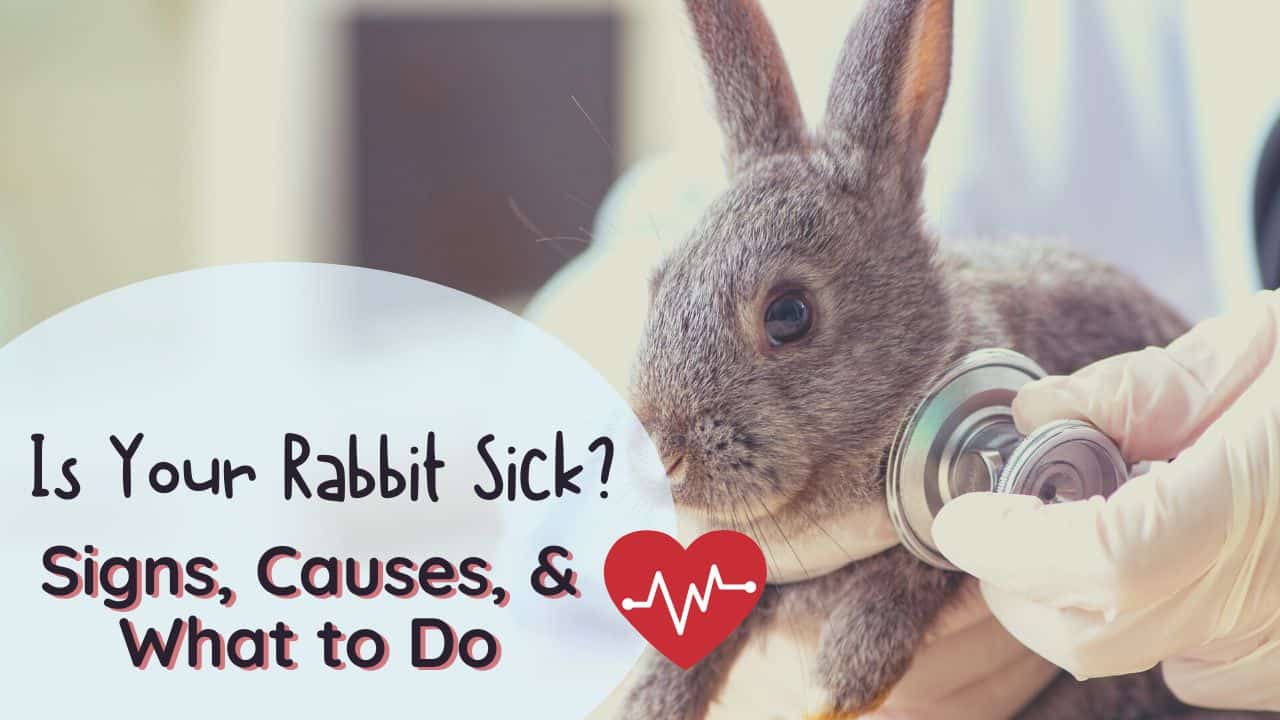Rabbits are among the most common pets worldwide. Their simple management, agility, and friendliness make them a wonderful choice for different types of people, including busy parents and kids.
But just like other creatures, rabbits get sick too. Rabbits are very secretive animals, and that means it’s not easy to spot early signs of illnesses. So how do you know if your bunny is sick? What are the signs of illness in rabbits, and what should you do if you think your rabbit is sick?
To help you tackle this tricky topic, we’ve brought together the veterinary-approved, science-based information you need to know about rabbits’ health problems into one comprehensive guide.
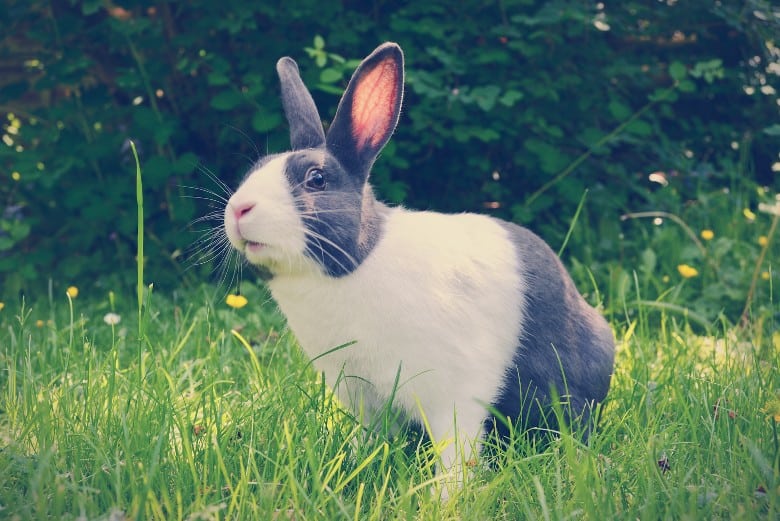
In this article, you will learn about:
- How to know if your rabbit is sick
- Common illnesses in rabbits
- What to do if your rabbit is sick
- How to keep your rabbit healthy
How Do You Know if Your Rabbit Is Sick?
Rabbits are cute, lovable, but secretive companions. Knowing your rabbit and monitoring its daily habits is the best way to track its health. Rabbits lived as prey animals in the wild. They became experts in hiding signs of illness or injury to avoid appearing as easy targets to predators. This adaptation helped them survive in the wild, but it makes it challenging to know when your rabbit falls ill.
The House Rabbit Society urges bunny owners to be attentive to subtle changes in their pets and even their body temperature. You should find a rabbit-savvy vet and schedule annual or biannual checks. This is because you may not have time to search for a vet when your bunny becomes ill.
Here are four key indications that your rabbit might be sick:
- Appetite variations
Rabbits eat constantly with few breaks when awake to maintain their energy needs. They have a complex and very efficient digestive system. A rabbit’s diet consists of hay, leafy green vegetables, and a small amount of pellets or nuggets. Hay is the most important component of your bunny’s diet due to its high fiber content, which is essential in maintaining a healthy digestive tract.
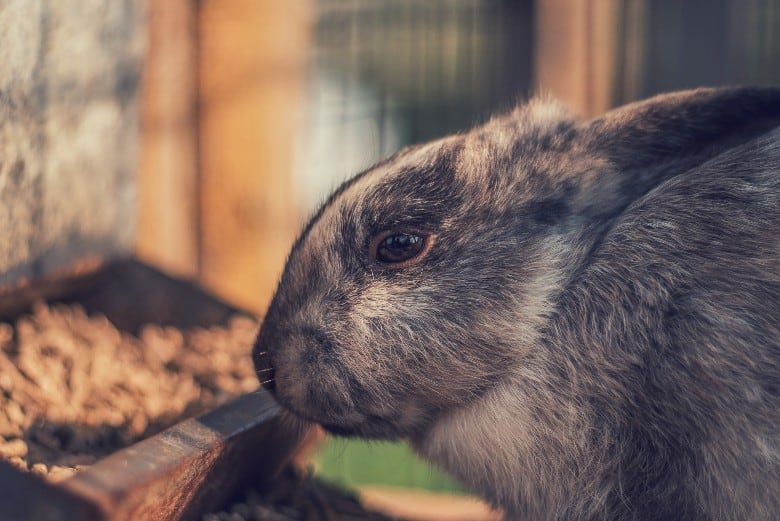
If your bunny refuses to eat even its favorite treats or consumes less than usual, it is a sign that it’s sick. The most common include dental disease, reaction to a new diet, and respiratory problems.
Poor appetite, lethargy and fever could also be a sign of gastrointestinal stasis. This is a serious health problem that can be fatal if left untreated. It is caused by a poor-quality diet, inadequate fiber, and environmental factors.
Dehydration can also negatively impact your rabbit’s appetite. Besides providing unlimited food, be sure to provide a continuous supply of fresh, clean water. You can use sipper bottles or heavy ceramic bowls.
Continuous feeding is essential in rabbits to keep their guts moving. They can’t tolerate skipping meals like other animal species.
If your rabbit doesn’t eat for a day, or you notice they’ve eaten less than normal, contact your vet ASAP.
- Changes in fecal output
Rabbits’ frequent eating habits result in regular defecation. Large, uniformly round fecal pellets characterize a healthy rabbit’s feces. Small, irregularly shaped droppings or excrements with matted fur are a red flag for underlying health problems.
Rabbits have a unique digestive system that produces two types of feces – fecal pellets and cecotropes. Cecotropes are droppings resembling a glossy grape-like cluster. They contain plenty of beneficial bacteria and nutrients that weren’t absorbed during the first digestive cycle. Rabbits reingest cecotropes directly from their anuses, so you rarely see them.
Fecal pellets, on the other hand, are brown, uniformly round balls released after reingestion and processing of cecotropes. They are the normal rabbit feces you will see in the enclosure.
The shape, consistency, and quantity of fecal output can help you assess your rabbit’s health condition. An imbalance in a bunny’s gastrointestinal system can result in diarrhea. Diarrhea may cause dehydration which can rapidly kill your rabbit without prompt vet intervention.
- Head tilt
Head tilt, torticollis, or wry neck is a condition where a bunny inclines its head to one side. Rabbits are sure-footed animals and are unlikely to hurt their necks or head. If your rabbit’s head is tilted, it could signify neurological disease or other health conditions. It has many causes, including inner ear infection, stroke, cancer, and cervical muscle contraction.
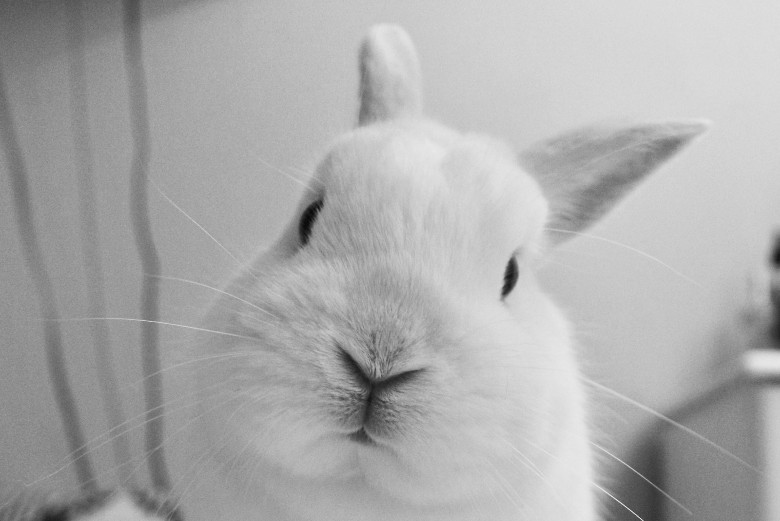
The wry neck posture may be continuous or intermittent, and if your rabbit is feeling pain, its naturally hunched position may appear more pronounced.
Take your bunny to a vet immediately if you notice a head tilt so that they can check for underlying causes.
- Abnormal behavior
If you find yourself asking “Why is my bunny acting weirdly?” the answer could be a health condition.
Although most rabbits don’t enjoy being held or cuddled, they are active, alert, and playful creatures. Some rabbits will jump up to greet you, others are vibrant, running all over their houses, while others are averagely active. Younger rabbits tend to be more active than older ones, and it is normal for activity levels to decrease gradually with age.
Rabbits naturally huddle down to conserve body heat, but they should still be interested to see you when you approach.
Although rabbits all have their unique personalities, you should get used to your bunny’s usual behavior so that you can notice any changes. Sudden or progressive reluctance to move around, isolation, or aggression are warning signs that something is wrong.
You should also pay attention to the quiet noises your rabbit makes. A rabbit will purr and produce a soft teeth-grinding sound when it’s happy. However, loud tooth grinding with a sharper sound is often a sign of pain.
If you notice abnormal behaviors in your pet rabbit, seek your vet’s intervention right away.
Common Rabbit Illnesses
As a rabbit owner, it’s important to know about common diseases that might affect your pet and how to spot them. Due to their secretive nature, your rabbit might be very sick by the time you realize there’s something wrong. Keeping a close eye on it and acting rapidly when you notice the first signs is essential to maintaining its health.
Here is a run-down of some of the most common illnesses we encounter in veterinary clinics.
Flystrike
Flystrike is a situation where blowflies lay their eggs on wounds or soiled fur. The maggot hatchlings emerge and begin eating the available flesh. Flystrike is a painful and stressful condition. Besides causing bacterial infection, maggots can eat your rabbit to death.
In rabbits, flystrike is often associated with rabbit poopy butt. This occurs when a rabbit doesn’t eat some or all of its caecotrophs, which then get stuck around its bottom. Adult flies are attracted to the smell of feces and can bite your bunny’s skin until they create wounds on which to lay their eggs, causing fly strike.
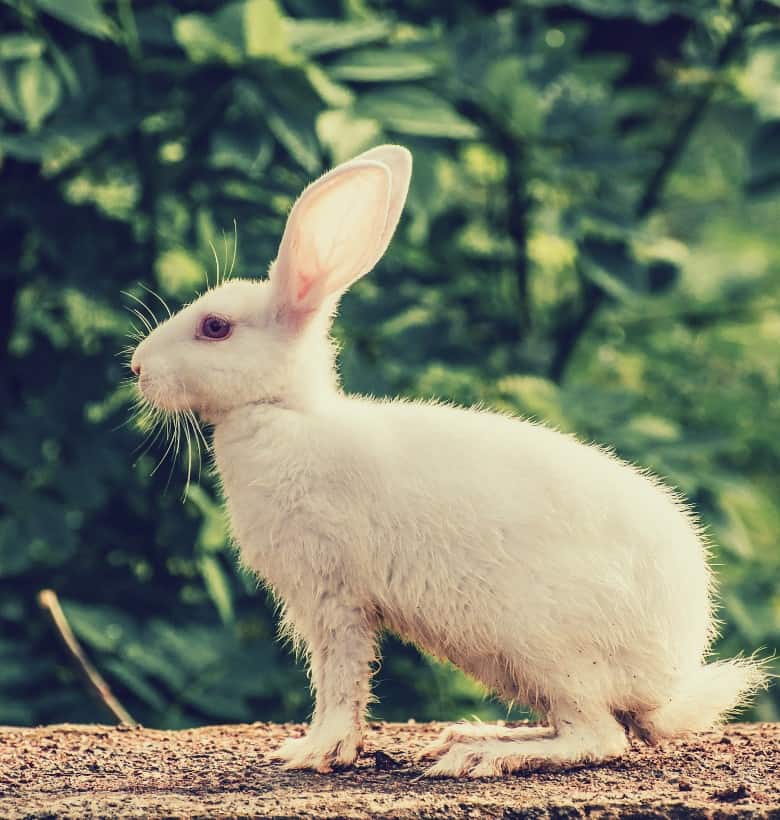
You can prevent it by keeping your pet healthy and giving the correct diet. Always keep your pet’s living area clean and dry. Replace dirty litter or bedding daily. It is also good to check your bunny’s butt daily to ensure it’s clean.
If any caecotrophs are stuck there, remove them with a paper towel. If the mess is already dry, spot-wash the bottom in shallow warm water until clean. Then rinse and dry the area completely with a clean towel. Make sure you are handling your rabbit properly and confidently throughout, so that they don’t jump and hurt themselves.
When you notice fly eggs or maggots, it’s an emergency. Don’t waste time cleaning your rabbit. Instead, rush it to your vet quickly.
Difficulties with a rabbit’s teeth development
Dental disease in rabbits is can manifest various clinical signs, including a wet chin or drooling, refusing to eat, not passing feces, and secondary gastrointestinal stasis.
Tooth problems are very common in rabbits and are mostly attributed to poor diet. A rabbit’s teeth grow continuously at a rate of around 2mm a week, which adds up to 4-5 inches annually. As your rabbit chews on fibrous foods, particularly grass and hay, the teeth are worn down so that they don’t get overgrown.
However, feeding on soft foods predisposes rabbits to overgrown teeth. These can develop spikes or spurs, which dig into the cheek or tongue, causing painful injuries.
A rabbit’s teeth can also be misaligned, so the upper and lower teeth don’t wear uniformly during chewing. This condition is known as dental malocclusion. Overgrown maloccluded teeth may take various directions, such as protruding from the mouth, growing at angles, and curling.
Have your vet examine your pet on the onset of dental disease signs for proper diagnosis and treatment. Depending on their severity, treatment of dental issues may involve teeth trimming and extraction. Rabbits with chronic tooth problems may require regular dental visits.
To keep your rabbit’s teeth healthy and at a reasonable length, feed it on a high-fiber diet with high-quality hay such as timothy, rye, and oat. You can also provide wooden toys to chew on and minimize overgrowth.
If left untreated, rabbit tooth problems can cause jaw bone infection, which is difficult to treat.
Upper respiratory infection
A runny nose, runny eyes, and sneezing, collectively known as snuffles, are symptoms of upper respiratory infection. Respiratory problems are often caused by various microorganisms such as viruses and fungi, but Pasteurella and Bordetella bacteria are the most common.
The infections are contagious to other rabbits and require immediate medical attention. Severely affected bunnies may require specialized treatment, including intravenous fluid boosting, oxygen therapy, and syringe feeding.
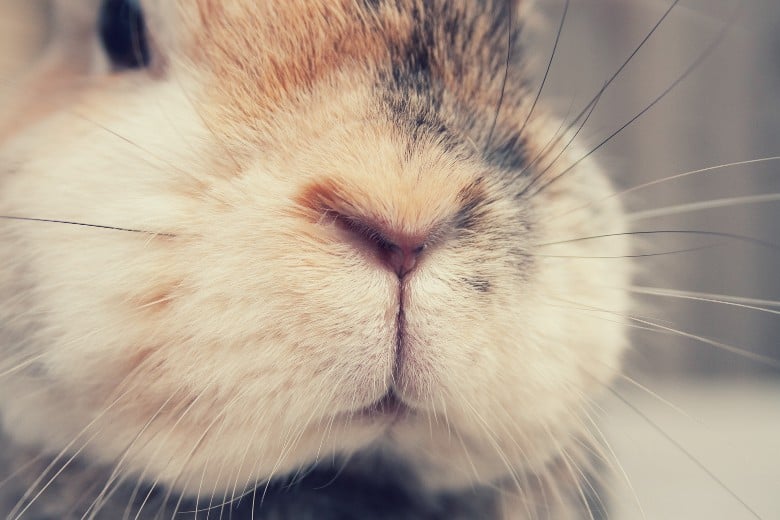
Left untreated, respiratory infections can kill your rabbit. However, with long-term treatment plus tender love and care, even serious problems such as pneumonia are curable.
Some rabbits recover fast, while others take time. Some develop a chronic condition, referred to as snuffles, that keeps recurring from time to time.
Treating acute respiratory infections can be very costly, so it’s best to embrace preventative measures.
To avoid upper respiratory infections in rabbits, maintain a clean, spacious, well-ventilated environment. Also, provide your rabbit with a healthy diet and fresh water.
Grooming issues
Rabbits are fastidious groomers who like keeping themselves clean and tidy. During grooming, rabbits may ingest hair. Accumulation of hairs in a rabbit’s stomach can cause hairballs, which can become fatal if not treated quickly. Affected bunnies cease their grooming habits, stop eating, and have distended tummies.
Due to their active grooming habits, signs of neglect, such as matted fur and poopy butt, should be a red flag that all isn’t well. Such issues may be attributed to being overweight, back pains, and tooth problems.
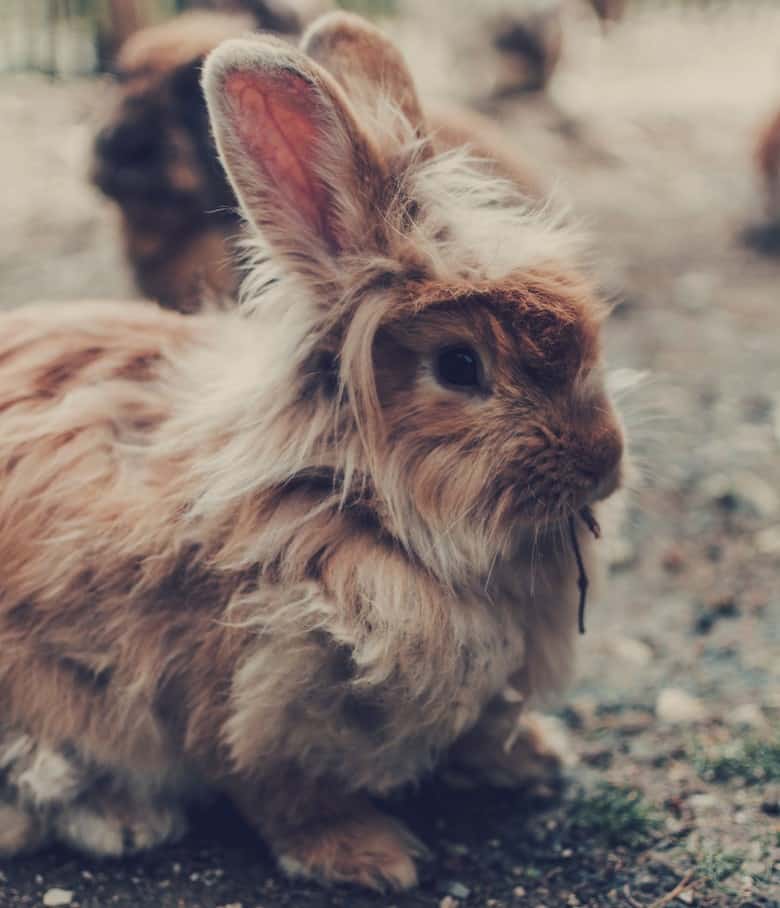
On the other hand, excessive grooming or scratching can be painful and often signify underlying problems such as external parasites. Dull coat or hair loss could be triggered by hormonal imbalances, digestive issues, or other anomalies.
What to Do if Your Rabbit Is Sick
By the time you notice warning signs that your rabbit is sick, it could be approaching a critical stage, so you should immediately seek your vet’s intervention.
How to treat a sick rabbit at home
You should contact your vet right away when your rabbit falls sick. You can offer some home remedies if the vet is unavailable immediately or before you get to the pet hospital. Most conditions cause your rabbit to stop eating, and your bunny’s life depends on getting its digestive system moving again.
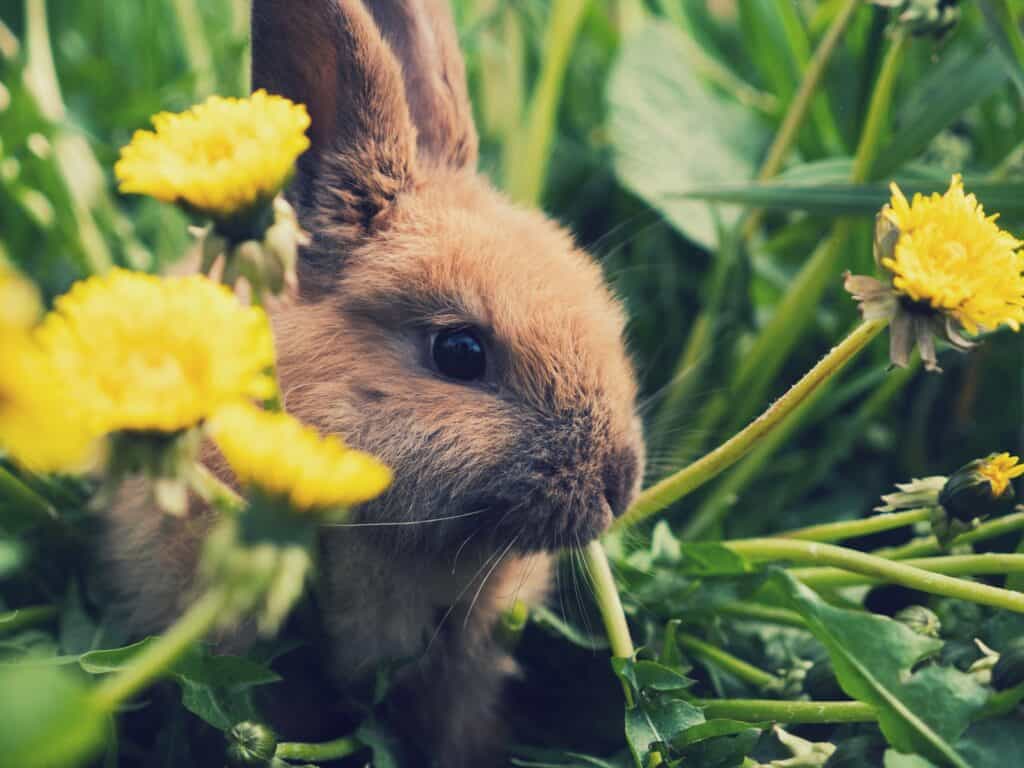
The first thing you can do is offer some of your rabbit’s favorite foods. Grass from the garden or dandelions can sometimes persuade a sick rabbit to start eating. If they still refuse, you may need to use a feeding syringe, aspirate some soft foods or baby food, and force-feed your rabbit to keep its digestive process moving.
If your rabbit has a mild condition, it should significantly improve after visiting the vet. To lower hospitalization costs, you can request to continue offering prescribed medicine at home. Remember, tender love and care are essential for quick recovery.
When to take your rabbit to the vet immediately
Due to rabbits’ secretive nature, illnesses may get to advanced stages before you realize it. Seeking immediate care from a rabbit-experienced vet could be essential to save its life.
Some conditions, such as GI stasis, anorexia, head tilt, and upper respiratory infections, are life-threatening. You should rush your rabbit to an emergency clinic if you suspect your rabbit could be suffering from one of these conditions.
How to Keep Your Rabbit Healthy
Rabbits may act as if they’re hardy, but they aren’t. Their bodies are delicate, and they’re susceptible to various conditions. Looking after your rabbit properly can help prevent illnesses and keep them happy and healthy.
For example, if you keep your rabbit constantly locked in its enclosure, it may become bored or lethargic, and may also get overweight. Ensure your bunny’s house has enough space for exercise and provide toys for it to play with. You can use simple, cheap toys such as a stuffed paper towel roll, a hay-filled cardboard oatmeal canister for rolling, or chewing toys.
Some other ways of keeping your rabbit healthy are:
- A fiber-rich diet containing high-quality hay, a few carbohydrates such as pellets, and various leafy green vegetables
- Clean, and well-ventilated housing
- Introduce changes gradually to minimize stress
- Schedule biannual or annual checkups
- Groom your pet weekly
If you get sick, don’t worry that you might make your bunny sick. Rabbits can’t contract illnesses from humans.
Related: How to Take Care of a Rabbit
Conclusion
Rabbits are great pets if they’re looked after in the right way. Although they are susceptible to common diseases, they are discreet in showing symptoms. This means you need to monitor their behavior, feeding, and physical condition every day to make sure you pick up on subtle changes. Have a plan in place, including the details of a nearby rabbit vet, so you’re ready if your rabbit shows signs of illness.
If you found this article helpful, share it with your fellow rabbit-owners!


